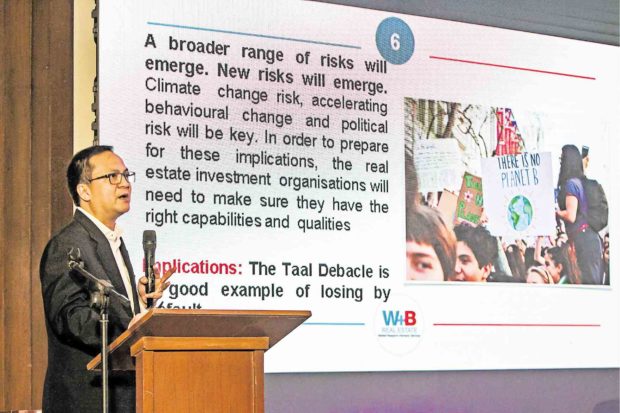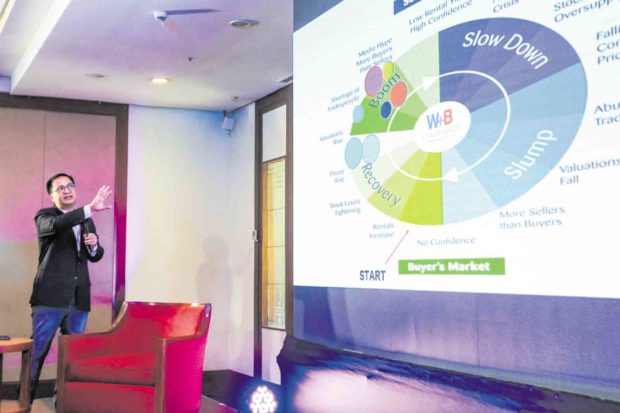Change will be huge in 2020

Soriano stressed the importance of learning how to adapt in order to survive amid new risks and new value drivers.
If there is one thing that we can bank on to remain constant, it is change. A common and overused sentiment, yes, but nevertheless true.
Change is not afraid to disrupt and unsettle what is believed to be established, even the seemingly optimistic future of the real estate industry for 2020. The changing landscape has major implications and developers must adapt early to survive.
As key players in a sector that requires big chips and big risks, it is necessary to learn how to adapt in order to survive. It is imperative to survey and understand new value drivers such as fast growing cities, the rising competition and the double-edged sword of sustainability and technological innovation because these will undoubtedly usher in greater risks alongside greater opportunities.
According to a PWC report, the property sector will find itself at the center of a rapid economic and social change.
While most of these trends are already happening, players are still underestimating their implications over the next six years and beyond. Real estate developments can still expect opportunities but this time, fraught with far greater risks and new value drivers. It is therefore important to plan for these changes.
Article continues after this advertisementThis, in a nutshell, was the message I had reinforced in the first ever, jampacked Property Forum of the Philippine Daily Inquirer entitled “State of Real Estate: A Clear Vision for 2020” in front of seasoned and battle-tested real estate veterans.
Article continues after this advertisementOpportunities everywhere
Building up on the talk of Colliers’ Richard Raymundo who had discussed data-driven insights, I shared the inevitable truth that the industry will encounter—that hope is not a strategy in the face of the ever-changing landscape where the opportunities and real threats are inextricably linked. And the best way to sustain the momentum is to plan and create powerful strategies that are deliberate and target specific.
The growing middle class is one of the two most powerful sectors to watch out for—but it is not without certain implications. Arguably, cities that are progressive will greatly benefit from the current boom while others will turn into ghost towns or downright disqualified due to certain factors that are out of reach such as poor local government support, slums and rampant crime.
The burgeoning population in the cities should also be looked at as an opportunity to explore creative ways of optimizing space. At the same time, the increasing urban sprawl should challenge developers to pursue smaller apartment and functional dwellings.
Another huge opportunity to bet on and watch out for is the aging population. The increasing global demand to support this phenomenon should compel stakeholders to create a new breed of asset class and invest in infrastructure.
You don’t have to do anything wrong to fail—your competitors will just have to do it right to take you out of the game
We are now witnessing a natural behavior of the tenants becoming owners. A “flight to quality migration” by long time lessees of old dilapidated apartments switching loyalty to new vertical developments that offer better convenience and amenities and the opportunity to own their first homes.
In short, developers are now called to become innovative with the available space. In an extended run especially for vertical developments, there is no other choice but to be more compelling and creative.
Hope is not a strategy, action is
The sector has been on an extended run for 10 years, and anything that goes up must come down soon. It is just a matter of time.
The biggest question that I would always pose to stakeholders is whether the landing will be a soft or hard one and thus, preparation is key.
Real estate companies and developers must embrace a higher degree of knowledge and expertise to understand and strategize the complexities of a mature property market.
There is also a need for deeper foresight to fully flesh out opportunities.
I cannot stress enough the importance of adopting a game plan that will brace and mount key players against the negative implications of rapid changes and the heavy impact that the government and technology will bring to the table.
Proceed with guarded optimism
The year 2020 will be promising but one should approach it with caution. One can hope but should act on it with clear cut strategies and the tenacity to implement it. Strategies could include the marriage of the old and new best practices, from online to offline, social and experiential, and sustainability and profitability.
However, out of all the strategies involved, it is clear that there is only one direction to take—forward. The world keeps an unforgiving pace and it will always move forward

Let me borrow a powerful message from Harvard Prof. Michael Porter: “Competitive strategy is about being different. It means deliberately choosing a different set of activities to deliver a unique mix of value.” Note the key words, being different and deliberate.
Hope is needed, but never bank on it.
